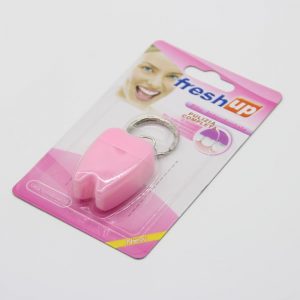Dental floss is a thin, flexible string used for cleaning between teeth. It is an essential tool in oral hygiene and is recommended by dentists to help remove food particles and plaque from areas that a toothbrush cannot easily reach. Here are some key features and benefits of dental floss:
- Interdental Cleaning: Dental floss is designed to clean the interdental spaces, or the gaps between teeth. These areas are challenging to reach with a toothbrush, making flossing crucial for preventing cavities and gum disease.
- Plaque and Debris Removal: Flossing helps to remove plaque buildup and food particles from between teeth, reducing the risk of tooth decay and gum inflammation.
- Gum Health: Regular flossing contributes to healthier gums by reducing the likelihood of gum disease. It helps prevent gingivitis, which is an early stage of gum disease characterized by inflammation and bleeding.
- Preventing Bad Breath: By removing food particles and bacteria from between teeth, flossing can contribute to fresher breath.
- Cavity Prevention: Flossing along with brushing can significantly reduce the risk of developing cavities, especially in areas where toothbrushes cannot access.
- Diverse Options: Dental floss comes in various forms, such as waxed, unwaxed, flavored, and different thicknesses. This allows individuals to choose the type of floss that suits their preferences and dental needs.
- Easy to Use: Flossing is a relatively simple process. You gently guide the floss between your teeth and slide it up and down along the sides of each tooth.
- Travel-Friendly: Dental floss is compact and easy to carry, making it convenient to maintain oral hygiene even while traveling.
- Complements Brushing: While brushing cleans the surfaces of teeth, flossing targets the spaces between teeth, providing comprehensive oral care.
- Professional Recommendations: Dentists and dental hygienists often stress the importance of regular flossing as part of a complete oral care routine.
It’s important to note that improper flossing technique can lead to gum irritation and damage, so it’s recommended to learn the correct technique from your dentist or dental hygienist. Additionally, some individuals might find alternatives to traditional flossing, such as interdental brushes or water flossers, more suitable for their needs.
Remember that maintaining good oral hygiene practices, including regular brushing and flossing, along with regular dental check-ups, is essential for overall oral health








